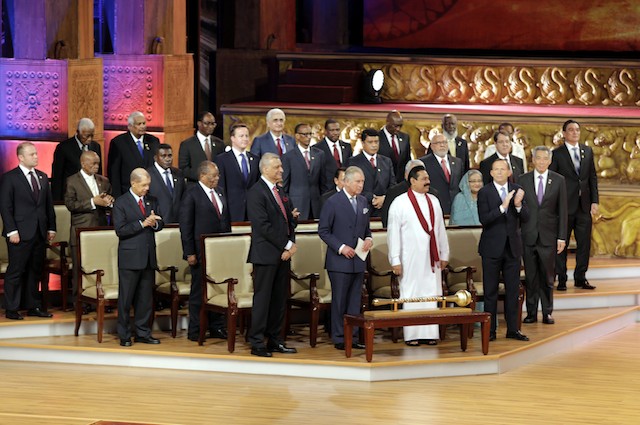SUMMARY
This is AI generated summarization, which may have errors. For context, always refer to the full article.

COLOMBO, Sri Lanka – Commonwealth leaders wrapped up a summit in Sri Lanka Sunday, November 17, putting on a united front after talks dominated by a bitter dispute over war crimes.
Leaders were expected to issue joint statements on issues such as debt management and funding to combat the threat which smaller countries face from climate change, before flying out of Colombo.
But the show of unity will do no more than mask the divisions within Commonwealth ranks after three days of talks which have been overshadowed by recriminations over the bloody end in 2009 to Sri Lanka’s 37-year war.
Australian Prime Minister Tony Abbott, who was handing over the chairmanship of the Commonwealth to Sri Lanka, acknowledged “more needed to be done” to address concerns about its rights record but said he wanted to be friends with Colombo.
“I am here as the representative of a country which wants to do the right thing by all the people of Sri Lanka,” he told reporters.
“Australia wants to be good mates with our friends and regional neighbors,” he added.
The summit was dealt several body blows before it began, with the leaders of Canada, India and Mauritius all deciding to stay away to protest at Colombo’s rights record.
Britain’s Prime Minister David Cameron then stole the limelight on the opening day with a visit to the war-torn Jaffna region, where he met survivors of a conflict that killed more than 100,000 people.
The summit host, President Mahinda Rajapakse, has had to fend off questions throughout the three-day gathering about his refusal to allow international investigators to probe exactly what happened at the end of the conflict.
According to the United Nations and rights groups, as many as 40,000 civilians may have died as troops loyal to the mainly Sinhalese government routed the Tamil Tiger rebel movement in its last stronghold in Jaffna.
Cameron warned Rajapakse that he would lead a push for an international probe through UN bodies unless an internal Sri Lankan inquiry produces credible results by March.
“Let me be very clear, if an investigation is not completed by March, then I will use our position on the UN Human Rights Council to work with the UN Human Rights Commission and call for a full, credible and independent international inquiry,” said Cameron.
Rajapakse later told reporters that Cameron was welcome to his view but added Sri Lanka must be allowed to complete its own investigation in its own time.
“They have to trust us,” he said.
“Pressure won’t do anything. …It’s much better to wait rather than demand or dictate.”
The largely pro-government press in Sri Lanka acknowledged that debate about Colombo’s human rights record had soured the summit.
“There is no escaping the fact that the Tamil diaspora had an undue influence … introducing exaggerated bilateral issues into conference discussions,” said the Sunday Island.
Ceylon Today said Cameron’s push for UN action had ensured “the festive mood at the Commonwealth parley turned sour”, bemoaning how “media obsession over the host country’s human rights record had overshadowed the official business of the summit”.
Only 27 out of 53 heads of government actually made it to Colombo but Commonwealth Secretary General Kamalesh Sharma denied that the summit had been a flop.
“As far as the outcomes are concerned, you will find at the end of this CHOGM, that it has been very productive, and it has been very meaningful and successful,” said Sharma, seated alongside Rajapakse.
One area where they are expected to find common ground is on ways to help smaller countries threatened by climate change gain access to funds promised by wealthier countries to mitigate the impact of global warming.
The prime minister of Samoa, one of many Pacific island nations threatened by rising waters, said there were no illusions about the danger of a lack of funds to fight climate change.
“We all know the causes, we all know the solutions, we all know the consequences,” said Prime Minister Tuilaepa Sailele Malielegaoi.
“All that is left is the political courage of the most powerful nations to take the action that is necessary to stop climate change,” he added. – Rappler.com
Add a comment
How does this make you feel?





There are no comments yet. Add your comment to start the conversation.